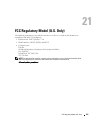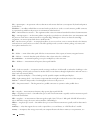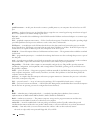
360 Glossary
E
ECC — error checking and correction — A type of memory that includes special circuitry for testing the accuracy of data
as it passes in and out of memory.
ECP — extended capabilities port — A parallel connector design that provides improved bidirectional data transmission.
Similar to EPP, ECP uses direct memory access to transfer data and often improves performance.
EIDE — enhanced integrated device electronics — An improved version of the IDE interface for hard drives and CD
drives.
EMI — electromagnetic interference — Electrical interference caused by electromagnetic radiation.
ENERGY STAR
®
— Environmental Protection Agency requirements that decrease the overall consumption of
electricity.
EPP — enhanced parallel port — A parallel connector design that provides bidirectional data transmission.
ESD — electrostatic discharge — A rapid discharge of static electricity. ESD can damage integrated circuits found in
computer and communications equipment.
expansion card — A circuit board that installs in an expansion slot on the system board in some computers, expanding
the capabilities of the computer. Examples include video, modem, and sound cards.
expansion slot — A connector on the system board (in some computers) where you insert an expansion card, connecting
it to the system bus.
ExpressCard — A removable I/O card adhering to the PCMCIA standard. Modems and network adapters are common
types of ExpressCards. ExpressCards support both the PCI Express and USB 2.0 standard.
Express Service Code — A numeric code located on a sticker on your Dell™ computer. Use the Express Service Code
when contacting Dell for assistance. Express Service Code service may not be available in some countries.
extended display mode — A display setting that allows you to use a second monitor as an extension of your display. Also
referred to as dual display mode.
extended PC Card — A PC Card that extends beyond the edge of the PC Card slot when installed.
F
Fahrenheit — A temperature measurement scale where 32° is the freezing point and 212° is the boiling point of water.
FBD — fully-buffered DIMM — A DIMM with DDR2 DRAM chips and an Advanced Memory Buffer (AMB) that
speeds communication between the DDR2 SDRAM chips and the system.
FCC — Federal Communications Commission — A U.S. agency responsible for enforcing communications-related
regulations that state how much radiation computers and other electronic equipment can emit.
fingerprint reader — A strip sensor that uses your unique fingerprint to authenticate your user identity to help secure
your computer.
folder — A term used to describe space on a disk or drive where files are organized and grouped. Files in a folder can be
viewed and ordered in various ways, such as alphabetically, by date, and by size.
format — The process that prepares a drive or disk for file storage. When a drive or disk is formatted, the existing
information on it is lost.
FSB — front side bus — The data path and physical interface between the processor and RAM.


















